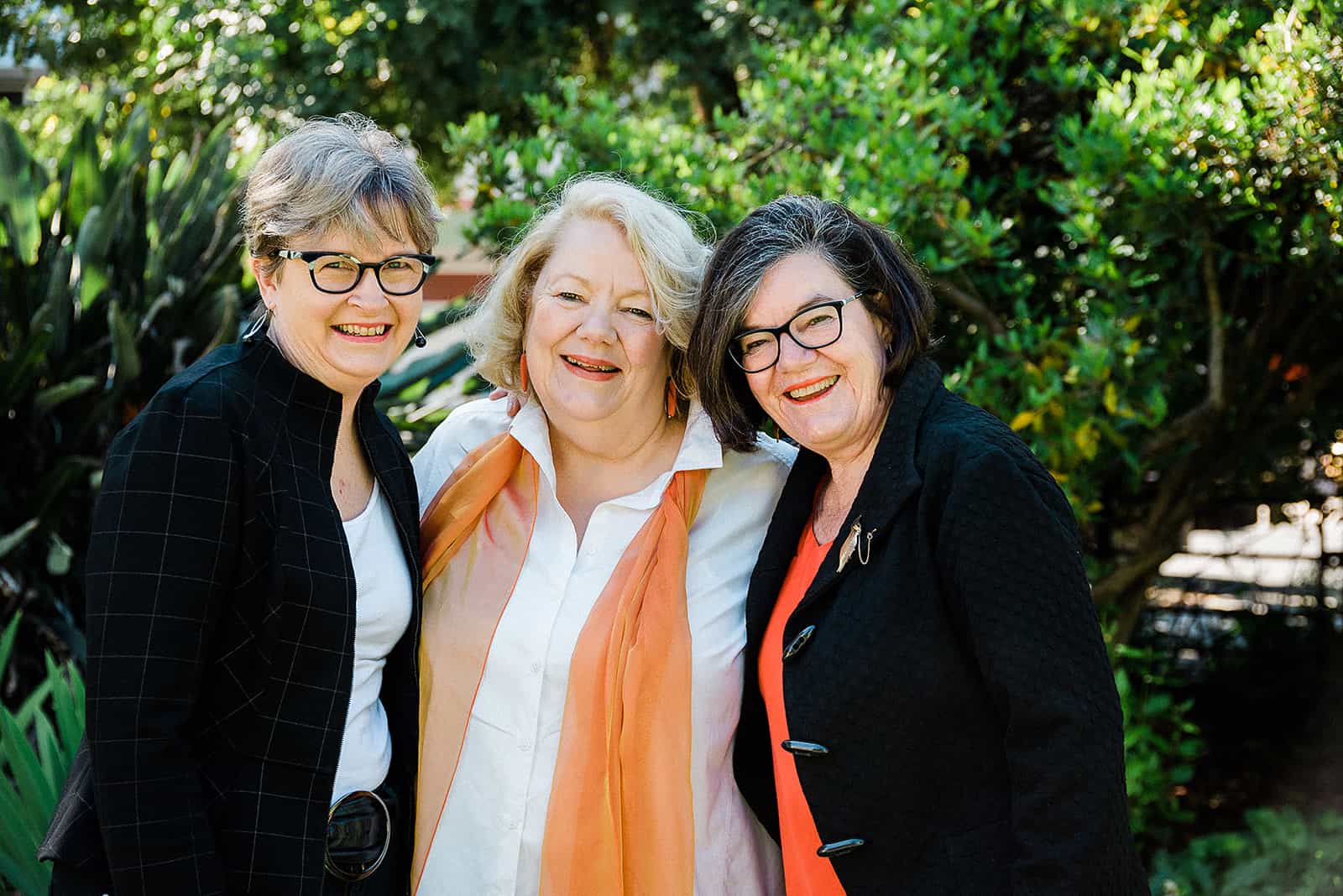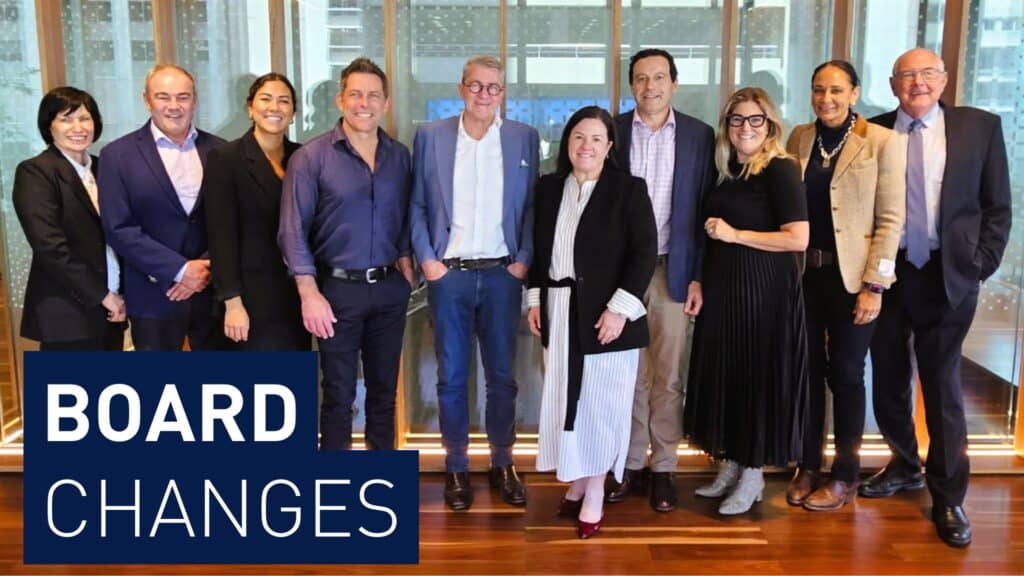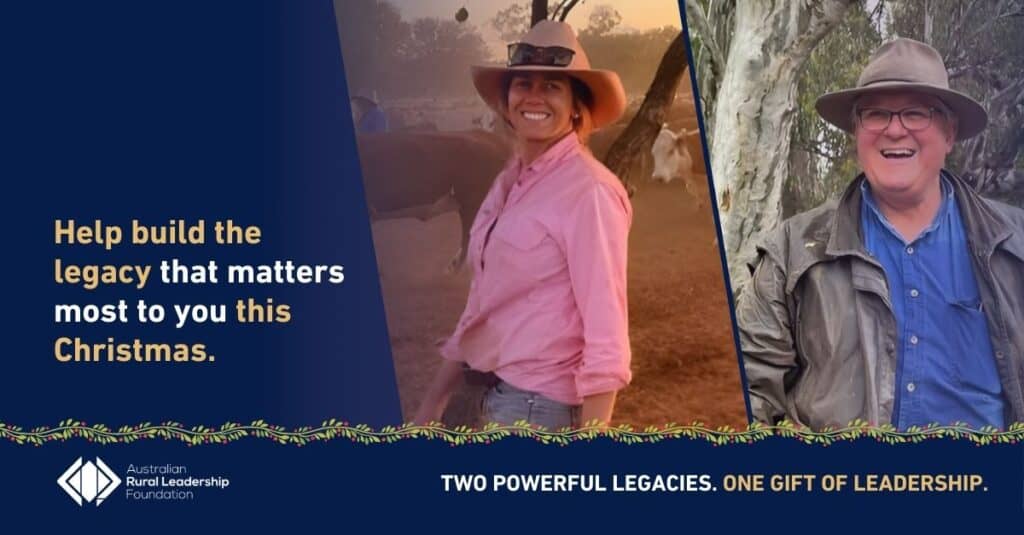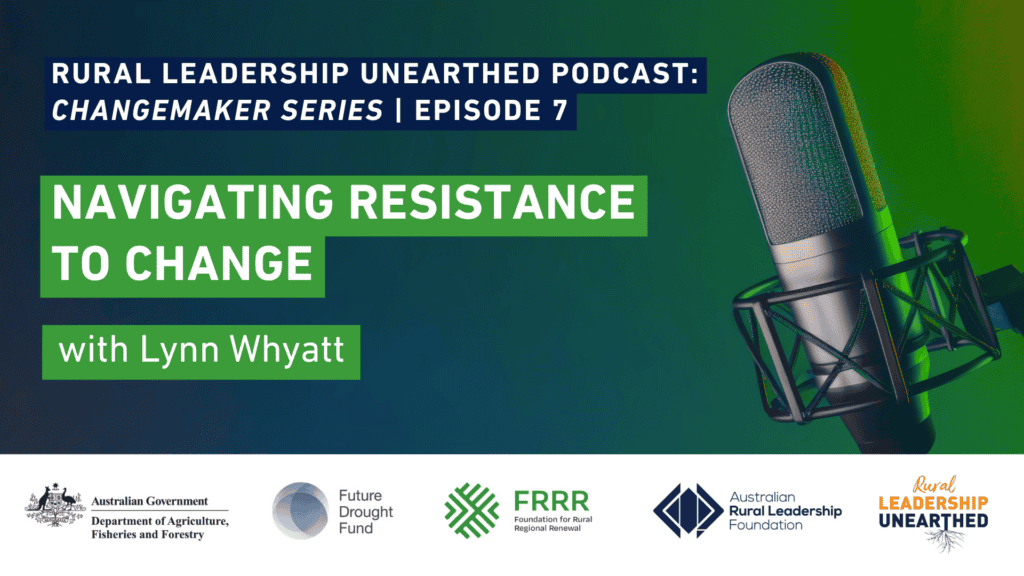Looking back to where it started. The three protagonists in this story would never call themselves heroes. They are both humble and heart-warming, inspirational and inimitable – and they are all long-time graduates of the ARLP. Cathy McGowan AO, Alana Johnson AM and Susan Benedyka didn’t do the program together. And their experiences on the program are certainly unique. Yet, in the decades since they completed their courses, they have all been very active in sharing what they learned and empowering others to step up to leadership roles.
Cathy honed her vision
Cathy completed the program in 1996 as a self described “feminist farmer”. One of only six women on the course, she initially found the masculine environment challenging. But she soon discovered it was an invaluable learning opportunity.
“I became an observer of effective behaviour. I watched those who rose to the top of the group and paid attention to when and how they spoke. Some people took up a lot of oxygen with little effect; others would ask one question and have more presence,” she said.
“Early in the course, I met with some of the group in Melbourne. They told me, in a matter-of-fact yet kind way, that I was being a pain in the butt; and that my antagonistic style was working to my disadvantage. Their honesty was invaluable and really helped me define my leadership style.”
Every ARLP cohort is tasked with developing a vision for their group. Cathy said, “It was incredibly hard to come up with this vision. Some in the group, like me, have a strong social agenda. Others are focused on productivity and growth. We finally agreed on a vision that I still refer back to every day: ‘To work for a prosperous, caring, rural Australia, alive with opportunities for all’.”
A great example of this vision in action was when Cathy mentored a group of young environmentalists in her local area. She helped them set up Indigo Power, a community-based energy company committed to powering local communities with clean energy. “Indigo Power really embodies the fact that regional Australia is alive with opportunities. You just need to bring people together to enable it,” she said.
The recently appointed AgriFuture’s chair adds the ARLP was a turning point for her.
“The ARLP really was a turning point for me. I went on to set up other leadership courses like the Alpine Valley Community Leadership Program. I knew where and how I could hone my leadership skills. And I gained the confidence to stand for election as president of Australian Women in Agriculture, which put me in good stead for what followed,” said Cathy.
Susan found her tribe
Susan first heard about the ARLP on the radio. She recalls sitting on her front verandah with friends, when an ARLP spokesperson started speaking about a new leadership program for regional Australians. From that moment, she knew it was something she wanted to do.
She had her chance in 1997. “It was extraordinary. I knew it would be tough, but I didn’t realise how profound the shift would be,” she said.
“The experience in the Kimberley with the local Aboriginal community was mind-blowing. Our Indigenous guide had such a remarkable connection to the land and demonstrated such subtle yet powerful leadership skills, particularly his ability to stand back and listen. He showed us what deep listening looked like, and how effective it can be.”
Midway through the course, Susan decided to set up her own consulting business to support others with environmental, community-based and economic objectives. Beyond that, she has been on the National Women’s Advisory Group; she has played a very active role in the Alpine Valley Community Leadership Program; she was involved in the Rural Agricultural Adjustment Scheme; and much more.
In all of these roles, Susan has found the alumni network to be a great asset. She regularly calls on other graduates and maintains strong relationships with other participants in the program. “The ARLP offers up so many different connections – whether it’s based on your geography, industry, the course you did or the friendships you make. Maintaining these connections has proven invaluable in my professional and personal life.”
“The ARLP gave me the opportunity to meet some extraordinary people. I wanted to find my tribe, learn new skills, and become a more effective leader. It delivered all this and more,” said Susan.
Alana broadened her perspective
Alana came to the ARLP in 2007 with an impressive background. She had been a board member of the Victorian Women’s Trust, an inaugural member of the Australian Rural Women’s Network and a founding member of Australian Women in Agriculture. The list went on.
“Until 2007, my world had revolved around agriculture, rural communities and the women’s movement. I wanted to understand the wider world. I wanted to broaden my perspective and work with people outside my circle,” she said. And so she applied for the ARLP.
“To start with, the experience in the Kimberley was transformative. It was far more challenging than I anticipated, and it was a huge disruptor in my life. The unexpected depth of self-reflection – particularly the recognition and shame I felt in terms of how little I knew about Aboriginal and Torres Strait Islander culture and history – was huge,” Alana said.
“The course gave me a deep appreciation of Indigenous culture. I’ve carried this with me ever since and remain committed to reconciliation in my community. In everything I do, I am very vocal about partnering with Indigenous clans and recognising cultural values.”
The course also gave Alana the skills to be a changemaker in a broader context. And she has certainly stepped up, having been appointed Chair
of the Victorian Catchment Management Council, Voices for Indi and the Victorian Women’s Trust. She was also a national runner-up in the 2010 Rural Women’s Award.
“I had been travelling along on a particular trajectory for so long. The ARLP helped me change my course, and it continues to support my endeavours. The ongoing collaboration with other graduates in the local area is playing a key role in the work we have been doing since.”
This work, as we will explore below, is all about sharing the leadership skills gained on the ARLP program – from deep listening to tolerance to appreciative enquiry – and empowering communities to take action.
The continuation of their story
As Cathy, Susan and Alana have shown, the ARLP has a remarkable, lasting and wide-reaching impact on people’s lives and the communities in which they live and work.
“Rural and regional Australia still has a long way to go before it reaches its potential. From infrastructure and services to representation in Federal politics, there is much work still to be done. I see great hope for the ARLP to activate more leaders to step up and do things for regional Australia,” said Cathy.
“Having heard our story, we are very optimistic that other graduates will be motivated to do similar things in their regions. If we can convince one in four people in our electorate to change their vote and change the system, others can too – and we’re here to help,” she said.
Indeed, these three women’s collective energy shows no signs of abating. Alana, who continues to act as a convenor for Voices for Indi, said, “We set about designing a process to give people a voice, leading to ongoing advocacy and empowerment for ordinary people. The work will not stop. We’ll continue to push for participatory democracy where communities come together around the critical issues in their region.”
Susan sums it up beautifully. “The things we did on the ARLP course took us to where we are today and will continue to guide us well into the future.”
Change in action: Voices for Indi
Alana, Cathy and Susan’s stories come together with Voices for Indi, a grassroots movement that began in 2012 when a group set out to build a new model of participatory democracy for the region. “There was a great despondency about democracy in the area and a distinct lack of local voices being heard,” explained Alana.
Voices for Indi set about changing this. Alongside local ARLP alumni and other community members, Susan, Alana and Cathy drew upon the lessons they learned during their ARLP experience to build a new, community-focused model of leadership.
Susan’s initial role was consultative, helping the fledgling Voices for Indi group to develop their vision and values. “Our sights were set on twenty-first century democracy and doing politics differently. Core to our values was the notion that everyone brings unique talent, time and skills to the table – we wanted to help everyone find their own place,” she said.
A series of Kitchen Table Conversations helped people find their place. As Alana explained, “We wanted to model the positive opposite of what was happening in the electorate and in Australian politics in general. Instead of exclusion and a combative environment, we created a welcoming space – literally around people’s kitchen tables – where everyone’s ideas, regardless of their political leanings, were respected and valued.”
A key theme emerging from these community gatherings was that a large number of Indi constituents wanted an opportunity to choose an independent politician as their representative in parliament. And so, having given community members a voice – and, more importantly, practicing deep listening to ensure those voices got heard – the Voices for Indi team then showed community members how to become changemakers.
Together, they mobilised a grassroots campaign in the lead-up to the 2013 election. This is where Cathy stepped into the picture, as the independent candidate for Indi. Having already participated in many leadership activities in the local community, Cathy was the perfect fit.
“This was not about the community giving me the power. I was one of many equals – we all had jobs to do, we all held each other to account. It was an interactive experience, where we set up a framework to enable and empower citizens,” she said.
“I reflected on my experience during the ARLP and really took those learnings on board – living the values I developed during the course. I held myself truly accountable and became a leader of integrity.”
Thousands of volunteers worked tirelessly during the campaign. Some stitched bunting, some hung corflute signs around town, others door-knocked and spoke to voters. “We wanted to create a place
for everyone. And it worked. Not only did we win the campaign, but a survey of our volunteers afterwards found that all of them were more likely to take further political action in the future,” said Susan.
Cathy went on to be re-elected in 2016. In 2019, the community invited another inspirational woman, Dr Helen Haines, to stand as an independent candidate. She won, too. From those early Kitchen Table Conversations, the people of Indi have clearly found their voice and, more importantly, been empowered to take positive action.
Applications for ARLP Course 31 open on 2 June. Expressions of interest can be submitted via our website.





